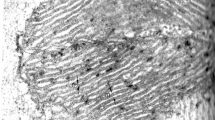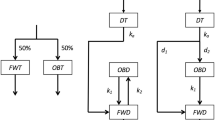Abstract
WHEN using potassium-42 to trace the exchange of potassium in a suspension of non-metabolizing mitochondria from rat liver, specimens were obtained in which the specific activity of mitochondrial potassium appeared greater than the specific activity of the separated labelling medium. The radioactive material used was spectroscopically pure 42K2CO3, which had been irradiated for one week at the Atomic Energy Research Establishment, Harwell. When measured on a M6 (‘20th Century Electronics’) Geiger-Müller counter, the apparent specific activity (counts/min./μequiv. potassium) of potassium on the labelled mitochondria was 1.5 times as great as that of potassium in the labelling solution (Table 1). On further investigation it was found that the decay of activity on the mitochondria corresponded to a half-life greater than 12.4 hr. (see Fig. 1).
This is a preview of subscription content, access via your institution
Access options
Subscribe to this journal
Receive 51 print issues and online access
$199.00 per year
only $3.90 per issue
Buy this article
- Purchase on Springer Link
- Instant access to full article PDF
Prices may be subject to local taxes which are calculated during checkout
Similar content being viewed by others
References
Slater, E. C., Symposia Soc. Exp. Biol., No. 10, 118 (Cambridge, 1957).
Author information
Authors and Affiliations
Rights and permissions
About this article
Cite this article
LUMB, G. Selective Uptake of Radiochemical Impurities by Mitochondria. Nature 181, 132–133 (1958). https://doi.org/10.1038/181132a0
Issue Date:
DOI: https://doi.org/10.1038/181132a0
Comments
By submitting a comment you agree to abide by our Terms and Community Guidelines. If you find something abusive or that does not comply with our terms or guidelines please flag it as inappropriate.



